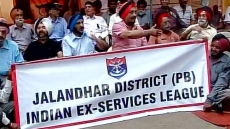It's wrong to put a "harsh lens" on India regarding gender inequality and sexual violence as it's not just confined to Indian borders but spread across the globe, says Vibha Bakshi, who framed the aftermath of the December 2012 gangrape on camera in the National Award winning documentary "Daughters of Mother India".
"We are not a rape capital of the world. It is wrong to paint everyone with the same brush. It's not just India's fight. This is a global issue as all rapists speak the same language. India is always under a harsh lens and I think that is wrong because it leaves people with disgust and disillusionment," Bakshi told IANS in an interview.
India earned global notoriety after a 23-year-old physiotherapy intern was brutally gangraped in a bus in New Delhi on December 16, 2002. But India is not the only country to be fighting the evil.
Mumbai-based celebrity hair stylist Sapna Moti Bhavnani has come out in the open about her ordeal when she was gangraped at gun point in Chicago. Bhavnani, who appeared in reality TV show "Bigg Boss 6", narrated her experience on social networking site Facebook, and drew a lot of attention.
In the same vein, Bakshi, who shared views about the need to spread awareness about sexual violence at TEDxWalledCity 2015 last month, even questioned that "there are so many incredible strong women and men of India, how can you erase that?" while painting India's image on the international map.
Her film "Daughters of Mother India" won a National Film Award in Best Film on the Social Issues category this year and it also walked away with the Best Documentary Film award at the 15th edition of the New York Indian Film Festival (NYIFF).
Bakshi, who embarked on a journey to find answers about women with the film, says the positive response to the film added impetus to her endeavour of bringing change in society.
"Our film takes a more panoramic view...with people who are relentlessly working towards change. And we have taken them as a model. The success has exceeded anything we could have hoped for. The film sensitised people and didn't leave people with disgust and disillusionment," she said.
"Our toughest critic, the police, also embraced the film. So, that is one step in the right direction," added Bakshi, who is also credited with the film "Terror At Home", which was part of the United States Government's Emmy Award winning campaign to Stop Violence Against Women.
What changes can a film bring to society?
"My film does not give you an answer. But it makes you think. I think a film can create empathy, which will be converted into action. It makes you retrospect about your attitude," she added.
The director, who has studied Journalism and Broadcasting from Boston University and New York University, noted that she has moved a step ahead with her campaign to usher in a change.
"Right now we are working very closely with the police across the country. We just launched a women safety campaign which hit all the theatres in Mumbai. Under this, theatres screened three films based on three disturbing sexual crimes of Mumbai of three-minute duration," she said.
Though the campaign was restricted to Mumbai, Bakshi says she is planning to make it pan-India starting with Delhi.
"We will soon start shooting in Delhi. The Mumbai campaign went viral. It will be a state-based campaign to bridge the gap between people and police," said Bakshi, who is also in talks to take her "Daughters of Mother India" for screening to the United Nations headquarters.



